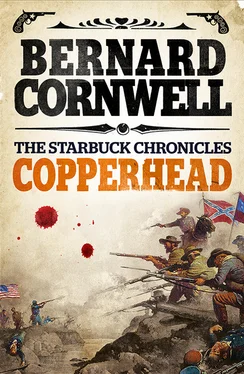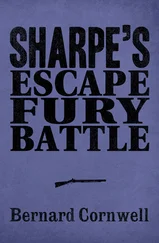After the meal the two friends walked eastward along the edge of the meadow. The Legion’s wood and sod shelters were still in place, looking like grass-covered pigpens. Starbuck, pretending to listen to his friend’s tales of headquarters life, was actually thinking how much he had enjoyed living in his turf-covered shelter. Once abed he felt like a beast in a burrow: safe, hidden, and secret. His old bedroom in Boston with its oak paneling and wide pine boards and gas mantels and solemn bookshelves seemed like a dream now, something from a different life. “It’s odd how I like being uncomfortable,” he said lightly.
“Didn’t you hear what I said?” Adam demanded.
“Sorry, dreaming.”
“I was talking about McClellan,” Adam said. “Everyone agrees he’s a genius. Even Johnston says McClellan was quite the cleverest man in all the old U.S. Army.” Adam spoke enthusiastically, as though McClellan were the new southern commander and not the leader of the north’s Army of the Potomac. Adam glanced to his right, disturbed by a sudden crescendo in the sound of musketry coming from the woods above the distant river. The firing had been desultory in the last hour, but now it rose to a sustained crackle that sounded like dry tinder burning fierce. It raged for a half minute or so, then fell back to a steady and almost monotonous mutter. “They must cross back to Maryland soon!” Adam said angrily, as though he were offended by the stubbornness of the Yankees in staying on this side of the river.
“So tell me more about McClellan,” Starbuck said.
“He’s the coming man,” Adam said in a spirited voice. “It happens in war, you know. The old fellows begin the fight, then they get winnowed out by the young ones with new ideas. They say McClellan’s the new Napoleon, Nate, a stickler for order and discipline!” Adam paused, evidently worried that he maybe sounded too enamored of the enemy’s new general. “Did you really cut a man’s throat for coffee?” he asked awkwardly.
“It wasn’t quite as cold-blooded as Decker makes it sound,” Starbuck said. “I tried to keep the man quiet without hurting him. I didn’t want to kill him.” In truth he had been scared to death of the moment, shaking and panicked, but he had known that the safety of his men had depended on keeping the sutler silent.
Adam grimaced. “I can’t imagine killing a man with a knife.”
“It’s not something I ever imagined myself doing,” Starbuck confessed, “but Truslow made me practice on some ration hogs, and it isn’t as hard as you’d think.”
“Good God,” Adam said faintly. “Hogs?”
“Only young ones,” Starbuck said. “Incredibly hard to kill, even so. Truslow makes it look easy, but then he makes everything look easy.”
Adam pondered the idea of practicing the skills of killing as though they were the rudiments of a trade. It seemed tragic. “Couldn’t you have just stunned the poor man?” He asked.
Starbuck laughed at the question. “I had to make sure of the fellow, didn’t I? Of course I had to! My men’s lives depended on his silence, and you look after your men. That’s the first rule of soldiering.”
“Did Truslow teach you that too?” Adam asked.
“No.” Starbuck sounded surprised at the question. “That’s an obvious rule, isn’t it?”
Adam said nothing. Instead he was thinking, not for the first time, just how unlike each other he and Starbuck were. They had met at Harvard, where they had seemed to recognize in each other the qualities each knew he lacked in himself. Starbuck was impetuous and mercurial, while Adam was thoughtful and painstaking; Starbuck was a slave to his feelings, while Adam tried desperately hard to obey the harsh dictates of a rigorous conscience. Yet out of those dissimilarities had grown a friendship that had endured even the strains that had followed the battle at Manassas. Adam’s father had turned against Starbuck at Manassas, and Starbuck now raised that delicate subject by asking whether Adam thought his father would be given command of a brigade.
“Joe would like him to get a brigade,” Adam said dubiously. “Joe” was Joseph Johnston, the commander of the Confederate armies in Virginia. “But the President doesn’t listen to Joe much.” Adam went on, “He likes Granny Lee’s opinion better.” General Robert Lee had started the war with an inflated reputation, but had earned the nickname “Granny” after an unsuccessful minor campaign in western Virginia.
“And Lee doesn’t want your father promoted?” Starbuck asked.
“So I’m told,” Adam said. “Lee evidently believes Father should go as a commissioner to England”—Adam smiled at the notion—“which Mother thinks is a dandy idea. I think even her illnesses would disappear if she could take tea with the Queen.”
“But your father wants his brigade?”
Adam nodded. “And he wants the Legion back,” he said, knowing exactly why his friend had raised the subject. “And if he gets it, Nate, then he’ll demand your resignation. I guess he’s still convinced you shot Ethan.” Adam was referring to the death of the man who would have married Adam’s sister.
“Ethan was killed by a shell,” Starbuck insisted.
“Father won’t believe that,” Adam said sadly, “and he won’t be persuaded of it either.”
“Then I’d better hope your father goes to England and takes tea with the Queen,” Starbuck said carelessly.
“Because you’re really going to stay with the Legion?” Adam asked, sounding surprised.
“I like it here. They like me.” Starbuck spoke lightly, disguising the fervid nature of his attachment to the Legion.
Adam walked a few paces in silence while the gunfire splintered remote, and distant like a skirmish in someone else’s war. “Your brother,” Adam said suddenly, then paused as though he suspected he was trespassing on a difficult area. “Your brother,” he started again, “is still hoping you’ll go back north.”
“My brother?” Starbuck could not hide his surprise. His elder brother, James, had been captured at Manassas and was now a prisoner in Richmond. Starbuck had sent James gifts of books, but he had not asked for any furlough to visit his brother. He would have found any confrontation with his family too difficult. “You’ve seen him?”
“Only as part of my duties,” Adam said, and explained that one of his responsibilities was to match lists of captured officers who were to be exchanged between the North and the South. “I sometimes visit the prison in Richmond,” Adam went on, “and saw James there last week.”
“How is he?”
“Thin, very pale, but hoping to be released on exchange.”
“Poor James.” Starbuck could not imagine his worried and pedantic brother as a soldier. James was a very good lawyer, but had always hated uncertainty and adventure, which were the very things that compensated for the dangerous discomforts of soldiering.
“He worries about you,” Adam said.
“I worry about him,” Starbuck said lightly, hoping to deflect what he suspected was an imminent sermon from his friend.
“He’ll certainly be pleased to hear you’re attending prayer meetings,” Adam said fervently. “He worries for your faith. Do you go to church every week?”
“Whenever I can,” Starbuck said, then decided this was a subject best changed. “And you?” he asked Adam. “How are you?”
Adam smiled, but did not answer at once. Instead he blushed, then laughed. He was clearly full of some piece of news that he was too embarrassed to tell outright, but nevertheless wanted prised out of him. “I’m really fine,” he said, leaving the opening dangling.
Starbuck caught the inflection exactly. “You’re in love.”
Читать дальше












